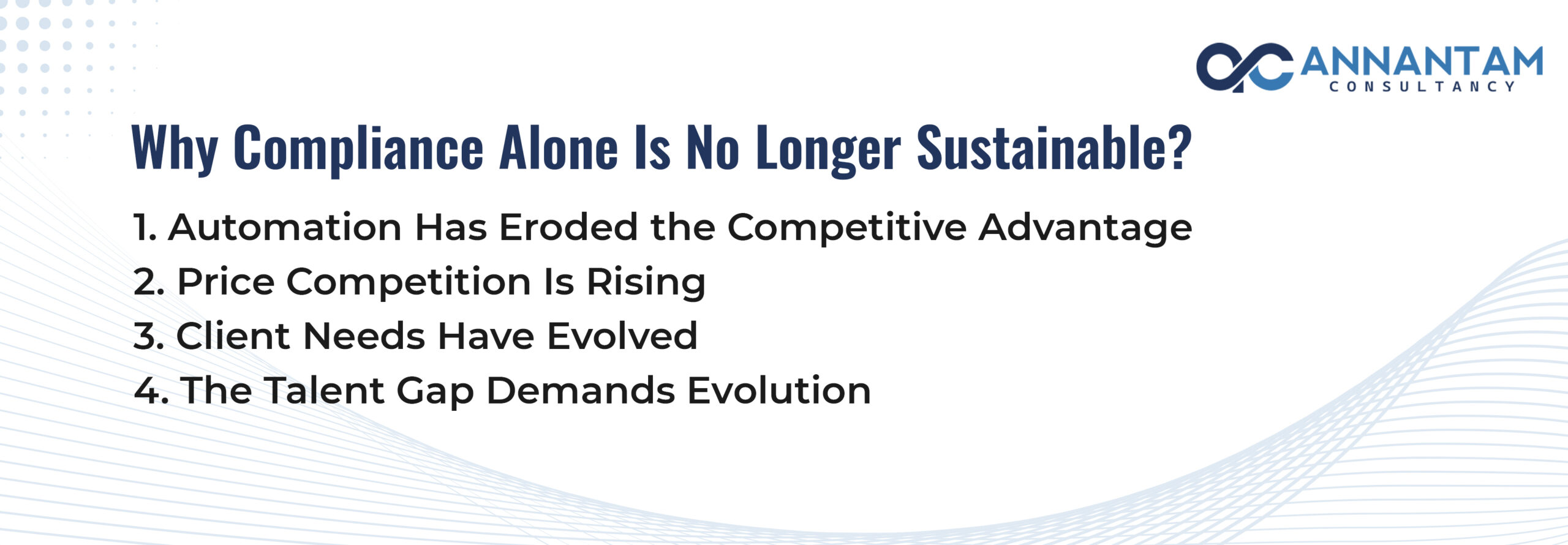For decades, accounting firms built their reputation on precision, compliance, and reliability. But in 2025, that foundation, while still essential, needs a few more value-adding changes.
Automation, cloud software, and AI are rapidly reshaping the compliance landscape. As a result, traditional compliance work, such as bookkeeping, tax filing, payroll processing, is becoming commoditized.
According to a 2024 Sage Practice of Now report, 82% of accountants believe clients now expect more business advisory and consulting services and firms that have already pivoted report average revenue growth of 25%–30% compared to their compliance-only peers.
The firms that will stay relevant and profitable are those that move beyond compliance to advisory, positioning themselves as strategic partners who help clients interpret data, make decisions, and plan for the future.
The Changing Role of Accounting Firms
The accounting profession is in the midst of transformation. The shift is driven by several powerful forces like:
- Automation of routine tasks: Cloud platforms like Xero, QuickBooks, and NetSuite automate reconciliations, journal entries, and even tax calculations.
- Data-driven decision-making: Clients need more than financial statements; they want insights that help them grow.
- Talent shortages: With fewer accountants entering the field, firms must use technology and advisory work to retain and attract skilled professionals.
In this environment, the firms that focus only on compliance are seeing margin compression and client attrition. Meanwhile, those that integrate advisory and strategic finance services are building lasting relationships and stronger revenue streams.

Why Compliance Alone Is No Longer Sustainable?
The compliance model is transactional. It’s reactive, repetitive, and increasingly automated. Clients see it as a necessity, not a differentiator. Here’s why it’s losing ground.
Automation Has Eroded the Competitive Advantage
What was once labor-intensive is now system-driven. Bookkeeping, data entry, and reconciliations are largely automated, making it difficult for firms to charge premium rates for compliance-only work.
Price Competition Is Rising
As technology levels the playing field, clients can easily compare pricing. Firms that rely solely on compliance services are being forced into cost-based competition, a race to the bottom.
Client Needs Have Evolved
Entrepreneurs and CFOs want guidance, not just reports. They expect accountants to help interpret trends, identify risks, and improve performance. Firms that fail to deliver this added value risk losing clients to more forward-thinking competitors.
The Talent Gap Demands Evolution
According to recent AICPA data, accounting program enrollments in the U.S. dropped by 17% between 2012 and 2023, and more professionals are retiring early. Young accountants are drawn to roles that emphasize problem-solving and strategy, not just compliance checklists.
The Rise of Advisory Services
Advisory services are now the natural evolution of accounting. They bridge the gap between financial accuracy and business growth. These services go beyond reporting what has happened, they help shape what will happen next. Examples include:
- Cash flow forecasting and management
- Profitability analysis and pricing strategies
- Budgeting and variance analysis
- Business performance dashboards
- Tax planning and entity structuring
- Virtual CFO and financial leadership support

How Firms Can Make the Shift?
Transitioning from compliance to advisory doesn’t mean abandoning your core accounting services. It means reimagining and rebalancing your service portfolio. Here’s how to do it.
Automate the Repetitive Work
Leverage technology to eliminate manual data entry and reconciliation. Cloud accounting platforms and integrated CRMs give teams real-time access to financial data, freeing up time for higher-value analysis.
Reposition Your Brand and Messaging
Clients should see your firm not just as a service provider but as a growth advisor. Update your website, proposals, and communication to emphasize strategy, insights, and long-term partnership.
Upskill Your Team
Train your accountants to think like analysts and advisors. Invest in soft skills such as business communication and data visualization, skills that make financial insights actionable.
Offer Tiered Service Models
Bundle compliance and advisory offerings together. For example:
- Tier 1: Bookkeeping and tax filing
- Tier 2: Compliance + monthly financial reporting and insights
- Tier 3: Full virtual CFO services, cash flow forecasting, and growth strategy
This allows clients to start small and grow into more strategic partnerships over time.

The Future: Accountants as Business Partners
The accountant of the future is a multi-tasker – a strategist, a technologist, and a trusted advisor. In a market where compliance is increasingly automated, human insight becomes the true differentiator.
Firms that shift from compliance to advisory will not only stay relevant, they’ll lead the next era of accounting innovation. Those that don’t risk being left behind, not by competitors, but by their own clients’ changing expectations.
Because the future of accounting isn’t about producing reports but about producing results.




